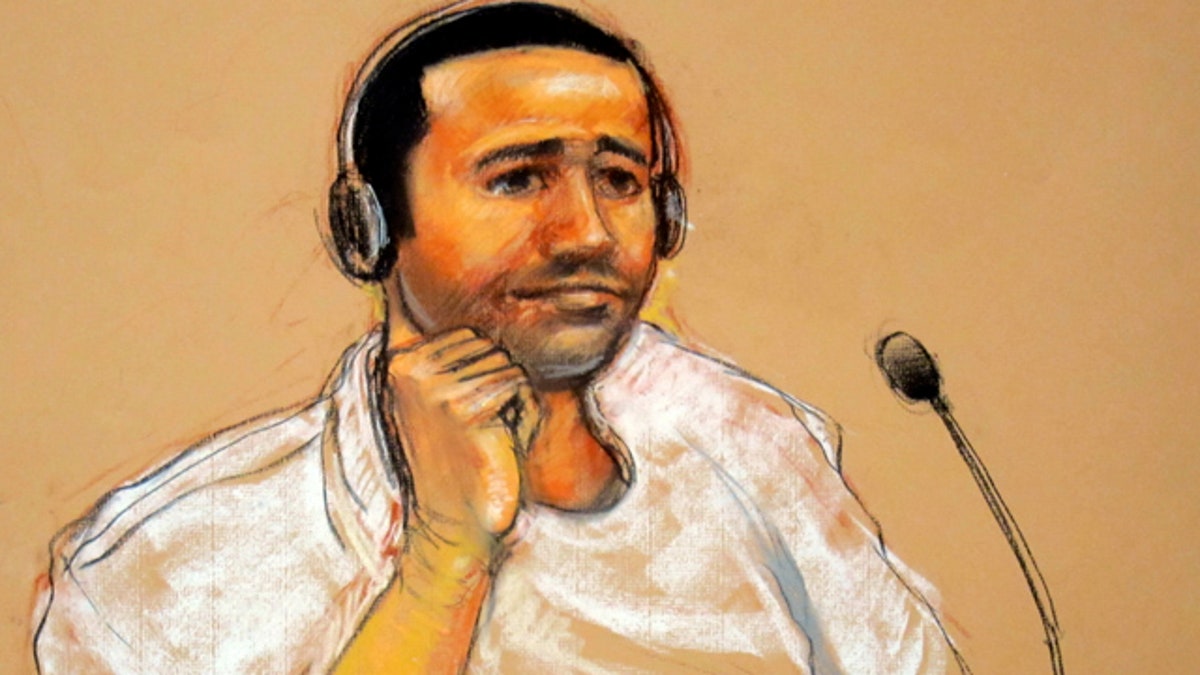
Nov. 9: In this sketch by courtroom artist Janet Hamlin, reviewed by the U.S. military, Abd al-Rahim al-Nashiri is seen during his military commissions arraignment at the Guantanamo Bay. (AP)
A top figure in Al Qaeda, who was held in a series of clandestine CIA prisons and subjected to waterboarding and mock executions, emerged Wednesday after nine years to face charges of orchestrating the deadly attack on the USS Cole.
The proceedings marked the start of a new round of Guantanamo Bay war crimes tribunals under a president who vowed to halt them.
The Saudi suspect, Abd al-Rahim al-Nashiri, did not enter a plea as he was arraigned. The detainee, who was subjected to the harsh interrogation techniques that his lawyers say amounted to torture, appeared relaxed in court. He gave the thumbs up sign twice and even joked with the judge about his poor English.
It was the first time al-Nashiri, now 46, has been seen in public since his 2002 capture. He has gained a considerable amount of weight in custody and was clean shaven for his appearance Wednesday. He was unshackled and declined civilian clothes in favor of his white prison uniform. He wants to keep all the members of his appointed legal team.
"At this moment, these lawyers are doing the right job," he told the judge.
Although he appeared at ease, the charges against him are severe. They include murder in violation of the law of war in the 2000 suicide bombing of the USS Cole in Yemen, an attack that killed 17 crew members. Authorities say he took orders directly from Usama bin Laden and also set up the October 2002 bombing of the French supertanker MV Limburg, which killed one crewman, as well as a failed attack on another American warship, the USS The Sullivans in January 2000.
A likely defense strategy will be to place the CIA interrogation program on trial. To be sure, in what some perceived as an extraordinary turn of events, Richard Kammen, the lead defense attorney, put questions from al-Nashiri to the judge ranging from the judge’s opinion on the death penalty to his definition of torture.
For example, if the judge came across evidence of torture, would he report the U.S. official to the international courts, Kammen asked, and since those behind the CIA program were never prosecuted for torture, how could the court consider death for al-Nashiri if convicted?
Three Guantanamo cases have been resolved through plea bargains under President Obama, but al-Nashiri is the first military tribuanl initiated under this administration and it is considered a prelude to the prosecution of the five Guantanamo prisoners who are accused of orchestrating the Sept. 11 attacks.
The trial of al-Nashiri will take place under a military commission system that has been revised by Congress and the Obama administration but is still subject to criticism from defense lawyers and human rights groups, who have complained about repeated changes in procedures and rules that favor the prosecution.
Legal experts have also questioned whether al-Nashiri should be charged with a war crime for the Cole bombing, which occurred before the Sept. 11 attacks and before the U.S. declaration of war on Al Qaeda.
Critics such as retired Air Force Col. Morris Davis, who resigned as chief prosecutor for the trials in October 2007 after alleging political interference by superiors, said the case against al-Nashiri and other prisoners should be moved to U.S. federal court to avoid having the convictions perceived as illegitimate.
"There is ample evidence to prove his case in federal court, where there is a long history of trying terrorism cases and certainly not this presumption of a kangaroo court," Davis said.
Al-Nashiri was captured in 2002 in Dubai and was held by the CIA in a series of secret prisons before being sent to Guantanamo in September 2006.
A report by the CIA inspector general revealed that al-Nashiri was one of the prisoners subjected to "enhanced interrogation techniques," including two instances of waterboarding. He also was threatened with a gun and a power drill because interrogators believed he was withholding information about possible attacks against the U.S.
He is now held in Camp Seven, a top secret section of Guantanamo where 15 "high-value" detainees are held, including the self-proclaimed mastermind of the Sept. 11 attacks, Khalid Sheikh Mohammed, who is expected to be arraigned next year in what is also likely to be a death penalty case.
The judge also set a tentative trial date for November 2012, but that date is likely to be postponed for months, if not years, delayed in part by efforts by his lawyers to challenge any statements he made as being the product of torture.
"By torturing Mr. al-Nashiri and subjecting him to cruel, inhuman and degrading treatment, the United States has forfeited its right to try him and certainly to kill him," his defense team wrote in one legal motion. "Through the infliction of physical and psychological abuse the government has essentially already killed a man it seized almost 10 years ago."
Obama took office pledging to close the Guantanamo Bay detention center but was rebuffed by Congress, which has refused to authorize moving prisoners from the American base in Cuba, forcing him to resume the war crimes prosecutions started under his predecessor.
Fox News' Catherine Herridge and The Associated Press contributed to this report.

